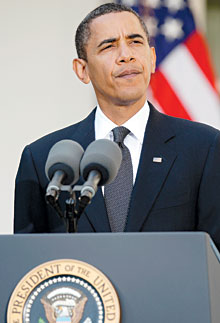WASHINGTON: Friday morning delivered a real shocker, as few anticipated the stunning choice of President Barack Obama to be named the winner of the 2009 Nobel Peace Prize so early in his presidency.
The announcement — made Friday morning in Oslo — comes at a critical juncture both domestically and internationally for Obama’s administration and has the potential to give him a political boost in each arena moving forward.
Just one week ago, Obama’s image took a blow — and many questioned his global prestige — when, just hours after he traveled to Copenhagen to personally make the case for Chicago to host the 2016 Olympics, his hometown was the first city eliminated in the International Olympic Committee’s vote. The peace prize should quickly erase the memory of that embarrassment for Obama and restore his image as a respected player on the world stage in the eyes of the international community.
Obama is not the first Nobel laureate to win mainly for raising hopes of a better world, rather than achieving peace. But rarely, experts say, does a politician win so soon after gaining power and without a major foreign policy accomplishment under his belt.
In its announcement, the Norwegian Nobel Committee hailed Obama’s “extraordinary efforts to strengthen international diplomacy and cooperation between peoples.”
The committee said it attached “special importance to Obama’s vision of and work for a world without nuclear weapons,” saying he had “created a new climate in international politics.”
Norwegian Prime Minister Jens Stoltenberg made clear the award carried big expectations, saying: “This is a surprising, an exciting prize. It remains to be seen if he will succeed with reconciliation, peace and nuclear disarmament.”
He praised Obama for “his extraordinary efforts to strengthen international diplomacy and cooperation between peoples,” citing his fledgling push for nuclear disarmament and his outreach to the Muslim world.
Obama, in a short acceptance speech from the White House Friday, said he felt humbled and unworthy of being counted in the company of the “transformative figures” of history who had won the prize.
The White House said it had no idea the Nobel announcement was coming. “It was not the news I expected to hear this morning,” he told reporters. “I do not view it as recognition of my own accomplishments but rather an affirmation of American leadership. I will accept this award as a call to action.”
Obama has been widely credited with improving America’s global image after the eight-year presidency of George W. Bush, who alienated both friends and foes with go-it-alone policies like the 2003 US-led invasion of Iraq.
The first African-American to hold his country’s highest office, Obama, 48, has struggled with a slew of foreign policy problems bequeathed to him by Bush, while taking a more multilateral approach than his predecessor. Some here said they viewed the award as a vote against Bush, rather than as a vote for Obama.
Despite troubles at home including a struggling economy that have eroded his once-lofty approval ratings, the Democratic US president is still widely seen around the world as an inspirational figure.
Obama is just the third sitting American president to receive the prestigious prize. He joins Woodrow Wilson and Theodore Roosevelt as prize winners. Former President Jimmy Carter is a Nobel laureate, as is ‘almost’ President Al Gore.
Carter said Friday that the Nobel Peace Prize awarded to President Barack Obama is a “bold statement of international support for his vision and commitment.”
His opponents in the Republican Party were not amused. In an official statement, the Republican National Committee said: “The real question Americans are asking is, ‘What has President Obama actually accomplished?’ It is unfortunate that the president’s star power has outshined tireless advocates who have made real achievements working toward peace and human rights. One thing is certain — President Obama won’t be receiving any awards from Americans for job creation, fiscal responsibility, or backing up rhetoric with concrete action.”
But others compared Obama’s prize to the 1978 award shared by Egyptian President Mohammad Anwar Al-Sadat and Israeli Prime Minister Menachem Begin, who negotiated peace between their countries which, at the time, provided much hope for security across the Middle East. Such peace still remains elusive.
Obama reminded the world of these challenges, when he told reporters on Friday: “We must recognize the rights of both Israelis and Palestinians to live in peace of nations of their own.”
In the Middle East, chief Palestinian peace negotiator Saeb Erekat said the award could be a good omen for the region. “We hope that he will be able to achieve peace in the Middle East and achieve Israeli withdrawal to 1967 borders and establish an independent Palestinian state on 1967 borders, with Jerusalem as its capital,” he said.
Israeli Defense Minister Ehud Barak said the prize should enhance Obama’s ability “to contribute to establishing regional peace in the Middle East and a settlement between us and the Palestinians that will bring security, prosperity and growth to all the peoples of the region.”
Hamas was skeptical. “Unless real and deep-rooted change is made in American policy toward recognizing the rights of the Palestinian people I would think such a prize would be useless,” Ismail Haniyeh, Hamas prime minister in the Gaza Strip, told reporters after Friday prayers.
Afghanistan’s Taleban mocked the choice, saying it was absurd to give it to Obama when he had ordered 21,000 extra troops to Afghanistan this year. “The Nobel Prize for peace? Obama should have won the Nobel Prize for escalating violence and killing civilians,” Taleban spokesman Zabihullah Mujahid said.


